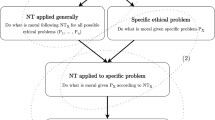Abstract
Sections 3.16 and 3.23 of Roger Penrose's Shadows of the mind (Oxford, Oxford University Press, 1994) contain a subtle and intriguing new argument against mechanism, the thesis that the human mind can be accurately modeled by a Turing machine. The argument, based on the incompleteness theorem, is designed to meet standard objections to the original Lucas–Penrose formulations. The new argument, however, seems to invoke an unrestricted truth predicate (and an unrestricted knowability predicate). If so, its premises are inconsistent. The usual ways of restricting the predicates either invalidate Penrose's reasoning or require presuppositions that the mechanist can reject.
Similar content being viewed by others
REFERENCES
Benacerraf, P.: 1967, God, the devil, and Gödel, The Monist 51, 9–32.
Boolos, G.: 1995, Introductory note to Gödel (1951), in K. Gödel, Collected Works III, Oxford University Press, Oxford, 1995, pp. 290–304.
Chalmers, D. J.: 1995, Minds, machines, and mathematics: A review of Shadows of mind, by Roger Penrose, Psyche 2(9) (http://psyche.cs.monash.edu.au/v2/psyche-2-09-chalmers.html).
Feferman, S.: 1962, Transfinite recursive progressions of axiomatic theories, J. Symbolic Logic 27, 259–316.
Feferman, S.: 1988, Turing in the land of O(z), in R. Herken (ed.), The Universal Turing Machine, Oxford University Press, New York, pp. 113–147.
Feferman, S.: 1995, Penrose's Gödelian argument: A review of Shadows of mind, by Roger Penrose, Psyche 2(7) (http://psyche.cs.monash.edu.au/v2/psyche-2-07-feferman.html).
Gödel, K.: 1951, Some basic theorems on the foundations of mathematics and their implications, in K. Gödel, Collected Works III, Oxford University Press, Oxford, 1995, pp. 304–323.
Gupta, A. and Belnap, N.: 1993, The Revision Theory of Truth, MIT Press, Cambridge, MA.
Kreisel, G.: 1972, Which number theoretic problems can be solved in recursive progressions on Π11 paths through O?, J. Symbolic Logic 37, 311–334.
Kripke, S.: 1975, Outline of a theory of truth, J. Philos. 72, 690–716.
Kripke, S.: 1982, Wittgenstein on Rules and Private Language, Harvard University Press, Cambridge, MA.
Lindström, P.: 2001, Penrose's new argument, J. Philos. Logic 30, 241–250.
Lucas, J. R.: 1961, Minds, machines, and Gödel, Philosophy 36, 112–137.
Lucas, J. R.: 1996, Minds, machines, and Gödel: A retrospect, in P. J. R. Millican and A. Clark (eds.), Machines and Thought: The Legacy of Alan Turing, Volume 1, Oxford University Press, Oxford, pp. 103–124.
McGee, V.: 1992, Maximal consistent sets of instances of Tarski's schema (T), J. Philos. Logic 21, 235–241.
Penrose, R.: 1989, The Emperor's New Mind: Concerning Computers, Minds, and the Laws of Physics, Oxford University Press, Oxford.
Penrose, R.: 1994, Shadows of the Mind: A Search for the Missing Science of Consciousness, Oxford University Press, Oxford.
Penrose, R.: 1996, Beyond the doubting of a shadow: A reply to commentaries on Shadows of the mind, Psyche 2(23) (http://psyche.cs.monash.edu.au/v2/psyche-2-23-penrose.html).
Putnam, H.: 1960, Minds and machines, in Sidney Hood (ed.), Dimensions of Mind: A Symposium, New York University Press, New York, pp. 138–164.
Shapiro, S.: 1985, Epistemic and intuitionistic arithmetic, in S. Shapiro (ed.), Intensional Mathematics, North-Holland, Amsterdam, pp. 11–46.
Shapiro, S.: 1998, Incompleteness, mechanism, and optimism, Bull. Symbolic Logic 4, 273–302.
Smullyan, R.: 1992, Gödel's Incompleteness Theorems, Oxford University Press, Oxford.
Turing, A.: 1939, Systems of logic based on ordinals, Proc. London Math. Soc. 45, 161–228.
Weir, A.: 1996, Ultramaximalist minimalism!, Analysis 56, 10-22.
Author information
Authors and Affiliations
Rights and permissions
About this article
Cite this article
Shapiro, S. Mechanism, Truth, and Penrose's New Argument. Journal of Philosophical Logic 32, 19–42 (2003). https://doi.org/10.1023/A:1022863925321
Issue Date:
DOI: https://doi.org/10.1023/A:1022863925321




